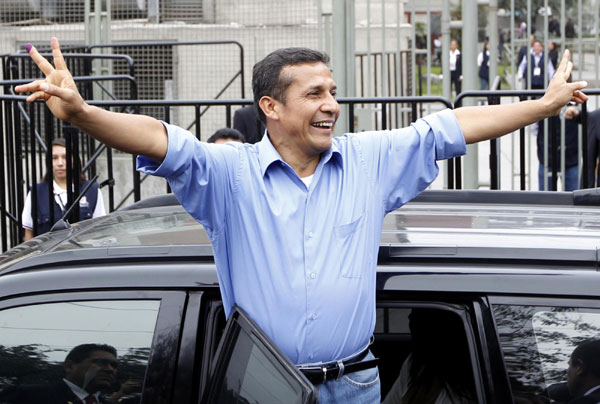Newsmakers
Leftist Humala wins Peru's presidential runoff
(Xinhua)
Updated: 2011-06-06 09:56
 |
Large Medium Small |
LIMA - Ollanta Humala, the left-wing candidate for the nationalist Peru Wins alliance, narrowly wins the second round of Peru's presidential elections Sunday, according to results from an independent election monitoring group.
While no official results have been released yet. Transparencia's figures show that with more than 90 percent of the ballots counted, Humala garners just over 51 percent of the vote while his rival Keiko Fujimori gets nearly 49 percent, daughter of former President Alberto Fujimori.
Exit polls by three other survey firms showed earlier that Humala would win with more than 52 percent of the vote.
|
 Peruvian presidential candidate Ollanta Humala gestures after casting his ballot in the runoff presidential election in Lima June 5, 2011. [Photo/Agencies] |
According to Ipsos Apoyo consultancy, Humala would have gained 52.6 percent of the votes and Keiko Fujimori from Force 2011 mustered 47.4 percent.
CPI consultancy's figures showed Humala got 52.5 percent and Fujimori 47.5 percent, while Datun said Humala got 52.7 percent and Fujimori 47.3 percent.
Both Humala and Fujimori have said they will respect the results of Sunday's vote.
There were no immediate reports of problems and eyewitnesses told Xinhua the voting process had been calm and that Peru's almost 20 million registered voters had been able to cast their ballots peacefully across the country.
Incumbent President Alan Garcia called on all Peruvians to vote for peace and democracy, and urged his successor to work for national unity.
"Peruvians must unite to consolidate Peru as one of the leading countries in the region," Garcia told reporters after casting his vote in the capital Lima's San Borja district.
He appealed to the next president to form a government of political reconciliation that will ensure "economic growth, the generation of jobs and fight against poverty."
As all the exit polls released put Humala in the lead, thousands of Humala supporters streamed out in the streets to celebrate and crowds gathered in front of the headquarters of the Peru Wins alliance in the capital Lima and in cities all over the country.
There were no immediate comments neither from Humala nor from Fujimori and her Force 2011 party, but spokesmen for both parties said they were awaiting the release of official results by Peru's National Office of Electoral Processes (ONPE).
Guillermo Palomino, spokesman for Force 2011, told local press that the party will wait until the release of official results before making any comments, and said "we are confident the numbers can still revert and turn in favor of Keiko Fujimori."
Daniel Abugettas, one of the spokesmen for the Peru Wins alliance and a member of the Peruvian parliament, said the party of Humala will "wait for the official results with caution" and appealed to people to "remain calm" and allow for an orderly transition.
The ONPE has said it will release preliminary results only if one of the candidates have a clear lead in what is still expected by many to be a close final vote count. The civil society Transparencia, meanwhile, denounced 56 acts of irregularities, all of which were related to acts of proselytism or problems with election material at voting stations.
The final weeks of the Peruvian election campaign have been marked by harsh personal attacks and two opposite political visions that has left Peru's population of some 30 million people bitterly divided.
Political analysts in Peru called on the two candidates to ensure that national unity prevails while Peruvian news papers appealed to Humala and Fujimori to work hard to build political reconciliation after Sunday's vote.
"We are going through a crucial time in Peru. Whoever will be the elected, the results must be respected and the candidate who wins must make a great effort to call for national consensus," said the leading Peruvian daily El Comercio in an editorial.
More than 103,622 polling tables were set up across Peru in addition to over 3,800 stations abroad, while some 77,000 police and 45,000 other security personal were deployed nationwide to safeguard the electoral process.
Peru's new president for the five-year term 2011-2016 will take power on July 28.
| 分享按钮 |